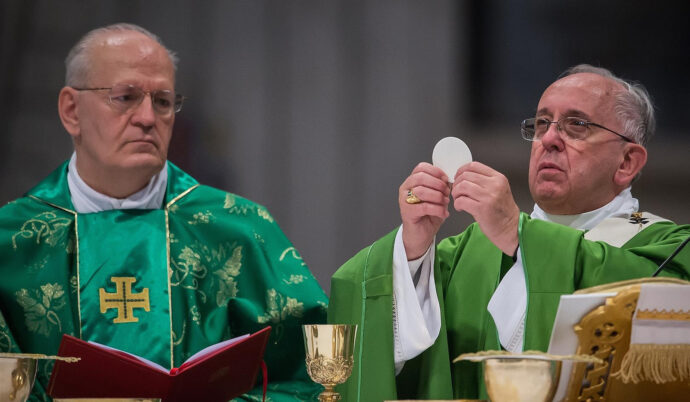Just a day before gay marriage in the U.S. received a significant boost from the Supreme Court, the much-anticipated Extraordinary Synod on the Family opened in Rome yesterday with Pope Francis pointedly criticizing “bad shepherds” who seek money and power and “lay intolerable burdens on the shoulders of others, which they themselves do not lift a finger to move.”
As some 190 bishops and a collection of lay advisors meet to discuss “pastoral challenges” facing Catholic families, divisions are being laid bare in the church that were largely suppressed in the Pope John Paul II/Benedict years, with a cabal of conservative bishops (presumably the “bad shepherds”) looking to beat back any liberalization of church doctrine promoted by more moderate cardinals.
Realistically any alteration of church doctrine that would come out of the synod would be modest and most likely would revolve around communion for divorced Catholics. On the more conservative end, there might be some minor tweaks to the annulment process that would broaden the grounds for annulment to include being too immature to have entered into a legitimate sacramental marriage.
On the most optimistically liberal end, Francis’ major ally Cardinal Walter Kasper has suggested some sort of “penance” work-around that wouldn’t alter the church’s teaching on the indissolubility of marriage but would allow some divorced Catholics to receive Communion even if they’ve remarried without having their previous marriage annulled.
From both the preparatory synod document and the buzz going in, there appears to be zero change of any revision to doctrine involving contraception or gay marriage.
But this doesn’t mean that the stakes aren’t still high. What’s evolving isn’t so much a battle over doctrine but a fight for the soul of the church. Francis and his allies are promoting a vision of the church that’s much more live-and-let-live, repeatedly turning to the word “mercy” to describe how they view the application of doctrine to the actual lives of Catholics, guided by a sense of the larger mission of the church as spreading the Gospel, not enforcing laws.
Conservatives, led by Cardinal Gerhard Müller, head of the Congregation for the Doctrine of the Faith, are insisting that there can be no change to church doctrine or its application, and they’ve launched a concerted campaign to forestall any changes regarding divorce and communion. In fact, Müller and four other cardinals, including Cardinal Raymond Burke, released a book just ahead of the synod entitled Remaining in the Truth of Christ: Marriage and Communion in the Catholic Church which counters arguments made by Kasper to the bishops last February. Müller also released a book-length interview in which he argues that the “total indissolubility of a valid marriage is not a mere doctrine, it is a divine and definitive dogma of the Church.”
In yet another book arguing against change, Cardinal George Pell, a key Vatican official, said the “sooner the wounded, the lukewarm, and the outsiders realize that substantial doctrinal and pastoral changes are impossible,” the better for the church.
Burke also conducted a teleconference with reporters last week to further argue that any change in doctrine is impossible and to cast doubt on assertions by Kasper that he was speaking for the pope when he said the church should find a way to extend mercy to divorced and remarried Catholics.
Kasper fired back with an interview in America magazine in which he accused the conservatives of “theological fundamentalism,” and said they “fear a domino effect, [that] if you change one point all would collapse,” referring to the fear that any change to marriage policy would undercut other positions related to sex. Kasper also accused conservatives of having “an ideological understanding of the Gospel that the Gospel is like a penal code.”
The hardliners on divorce were backed by an open letter to the synod signed by 48 conservatives, including prominent Catholics like natural law scholar Robert George and former US ambassador to the Holy See Mary Ann Glendon, but also conservative protestants like Rick Warren and signees from the Heritage Foundation and the Family Research Council, which suggests that the fight over the Catholic Church’s divorce policy is seeping into the larger political debate about same-sex marriage.
Decrying every conservative bogeyman from the increasing acceptance of cohabitation and out-of-wedlock birth to the “role of pornography and ‘no-fault’ divorce in the marriage crisis,” they call on the pope remain strong in support of “timeless truths about marriage” and suggest a series of steps the church can take to support more conservative notions of marriage, largely focused on pressuring couples to forswear divorce.
If this all sounds a lot like a political campaign on the part of conservatives, that’s because it is. And it’s emblematic of how they’ve largely run the church for the past 35 years, aligning themselves with political conservatives here in the U.S., taking a hardline stand against letting any daylight into church doctrine, and suggesting that anyone who would do so is literally going against the word of God.
But now Francis’ popularity, as well as the expectations of change that have been set by the synod, suggest a new calculus that shines a harsh light on this overt political maneuvering. This may give moderates the opening to make some modest changes that, while perhaps small in the lives of ordinary Catholics, will set the dangerous precedent that the church can change. Maybe conservatives are right to be afraid after all.




